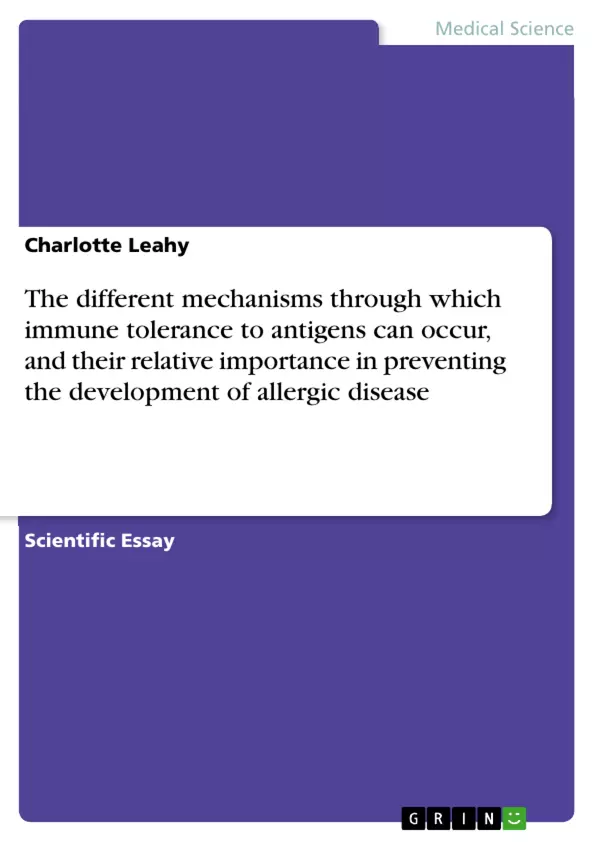Immune tolerance is the inhibition or absence of an immune response leaving only protective and beneficial immunity intact. Tolerance reduces response to both self and non-self antigens, which are substances which stimulate antibody production.
Tolerance breakdown causes immune disease; failed self-tolerance causes incorrect identification of self as foreign, causing autoimmune disease. Failure of induced tolerance causes overzealous identification of harmless foreign substances as a threat, causing hypersensitivities.
This essay explores the immunological mechanisms by which tolerance occurs, and their role in preventing the development of allergic disease.
Inhaltsverzeichnis (Table of Contents)
- Allergy
- Central Tolerance
- T-cell tolerance
- B-cell Tolerance
- Peripheral Tolerance
- Anergy
- Deletion
- B cell antibody production
- Immune Deviation
- Regulatory Lymphocytes
- Regulatory T cells: Treg, Trl, Th3
- Regulatory B cells: Breg, Br1, Br3
- Innate Immune System: Dendritic cells
- Immune Privilege
- Tolerance in Pregnancy
- Induced Tolerance
- Conclusion
Zielsetzung und Themenschwerpunkte (Objectives and Key Themes)
This work aims to provide a comprehensive overview of the various mechanisms through which immune tolerance to antigens can occur. It explores the critical role of tolerance in preventing the development of allergic disease.
- Central and Peripheral Mechanisms of Immune Tolerance
- The Role of Tolerance in Preventing Allergy
- The Importance of T-Cell and B-Cell Tolerance
- The Impact of Tolerance Breakdown on Immune Disease
- The Function of Regulatory Lymphocytes in Maintaining Tolerance
Zusammenfassung der Kapitel (Chapter Summaries)
The text begins by defining immune tolerance as the absence of an immune response, ensuring only protective immunity remains intact. It explains how tolerance breakdown can lead to various immune diseases, including allergies and autoimmune disorders.
The section on Allergy focuses on Type I hypersensitivity, mediated by IgE. It details the process of sensitization and the release of allergy mediators during acute reactions. The role of dendritic cells, Th2 cells, and mast cells in the allergic response is explained, with a visual aid illustrating the mechanism of tolerance.
The following chapters delve into Central Tolerance, highlighting the induction of lymphocyte apoptosis or anergy within primary lymphoid organs. The mechanisms of T-cell tolerance are described, emphasizing the importance of positive and negative selection within the thymus. The role of MHC presentation by thymic DCs in shaping the T-cell repertoire is discussed.
The chapter on B-cell Tolerance covers the induction of tolerance during B cell maturation. It explains how negative selection ensures self-reactive B cells undergo apoptosis or anergy. The process of receptor editing and its role in shaping the BCR repertoire are explored.
Schlüsselwörter (Keywords)
This work explores key concepts related to immune tolerance, including central and peripheral tolerance, T-cell and B-cell tolerance, regulatory lymphocytes, allergy, hypersensitivity, antigen presentation, MHC, and apoptosis.
What is immune tolerance?
Immune tolerance is the state where the immune system does not respond to specific antigens, preventing it from attacking the body's own tissues or harmless foreign substances.
What is the difference between central and peripheral tolerance?
Central tolerance occurs during the maturation of T and B cells in primary lymphoid organs, while peripheral tolerance happens in the rest of the body to control cells that escaped central selection.
How does a breakdown in tolerance lead to allergies?
When induced tolerance fails, the immune system incorrectly identifies harmless foreign substances (like pollen or food) as threats, leading to hypersensitivity reactions mediated by IgE.
What are Regulatory T cells (Tregs)?
Tregs are a specialized subpopulation of T cells that act to suppress immune responses, maintaining homeostasis and self-tolerance to prevent autoimmune diseases and allergies.
What is "Immune Privilege"?
It refers to certain sites in the body, like the eyes or the brain, where the immune system is restricted to prevent inflammation from damaging vital tissues.



